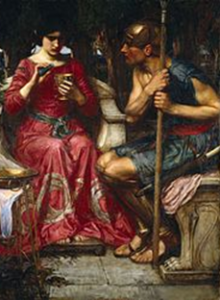The word “drug” first appeared, in various forms, in Middle French and English in the late 14th century, without recorded antecedents. It originally meant “any substance, of animal, vegetable, or mineral origin, used as an ingredient in pharmacy, chemistry, dyeing, or various manufacturing processes” (Oxford English Dictionary). It later came to mean “a natural or synthetic substance used in the prevention or treatment of disease, a medicine”, and later still “a substance with intoxicating, stimulant, or narcotic effects used for cultural, recreational, or other non-medicinal purposes . . . a controlled substance used illegally and often habitually.”
The OED lists examples of its use in this last sense from as early as the mid-17th century, but the examples are not convincingly exemplary of the meaning, and it is not until the late 19th century that the sense in which many people nowadays refer to “drugs” (as in “Is he on drugs/a drug addict?”) became clearly established. This, however, generates ambiguity. When you say “drug” do you mean a therapeutic drug or a recreational one?
Another problem with the word “drug” is that even in its earliest meaning it refers only to the active ingredient in the product that you administer or receive, which contains, as well as the active drug itself, many other substances, known collectively as excipients (in solid formulations) and the vehicle (in liquid ones), which supposedly lack therapeutic activity.
We need another, more specific and unambiguous, term—“medicinal product”, defined as a product that contains a compound with proven biological effects, plus excipients, or excipients only, and sometimes contaminants, chemical or biological. The active compound is usually a drug or prodrug but may be a cellular element.
A medicinal product is intended to be taken by or administered to a person or animal for one or more of the following reasons: (i) as a placebo; (ii) to prevent a disease; (iii) to make a diagnosis; (iv) to test for the possibility of an adverse effect or reaction; (v) to modify a physiological, biochemical, or anatomical function or abnormality; (vi) to replace a missing factor; (vii) to ameliorate a symptom; (viii) to treat a disease; and/or (ix) to induce anaesthesia. The definition, with its accompanying notes, does not include pharmacological compounds when used to probe systems, such as when phenylephrine is used to study baroreceptor reflexes.
The IndoEuropean root MED meant to measure and hence to ponder, judge, or prescribe. In Latin this resulted in words such as mederi (to heal), medens and medicus (a doctor), and medicamentum (a remedy). The o-grade form, MOD, accommodated the model of modified measurement—moderatio (restraint), moderator (a governor), modestus (temperate).

Picture: Medea mixes
medicine for Jason, as
depicted by the Pre-Raphaelite artist John William Waterhouse (1907)
In Greek μέδων was a ruler and μεδέουσα a guardian goddess, often applied to Aphrodite, but visible in the name of the Gorgon Medusa. The name of Medea, the sorceress whose skill with herbs led to so much destruction (picture), might also be thought to have derived in this way, and some have indeed suggested that her name is the root of our word medicine. However, her name comes from a different root, meaning cunning, spelt with an eta, not an epsilon, seen in other Greek names: Polymedes and Alcimedes (much or mighty cunning), and Diomedes (counselled by God).
The Medea syndrome or complex, from the legend recounted by Euripides, is a mother’s hatred for her children, also seen in men, or the variant psychopathy in which one spouse harasses the other in order to remove access to their children. We might now call that the Titchener syndrome. Another word, μήδεα, has a different origin still and means genitals, as in Ganymede, the cupbearer of the gods; γάνος means joy or pride.
“Medicament” is an acceptable alternative to “medicinal product”. Either of these terms should ideally be used in technical literature, and indeed whenever possible, to distinguish therapeutic medicines from recreational drugs, although one cannot expect headline writers, even in specialist journals, to use the longer terms when “drug” is monosyllabically available.
So, “When is a drug not a drug?” The answer could be “When it’s a medicament.”
Jeffrey Aronson is a clinical pharmacologist, working in the Centre for Evidence Based Medicine in Oxford’s Nuffield Department of Primary Care Health Sciences. He is also president emeritus of the British Pharmacological Society.
Competing interests: None declared.

